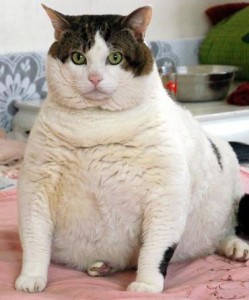Merriam-Webster’s dictionary gives three definitions for the term “fat cat:” 1) a wealthy contributor to a political campaign fund, 2) a wealthy and privileged person, a big shot, 3) A lethargic complacent person. All three  definitions fit with Jeremiah’s description of the citizens of Judah just before God’s judgment falls upon them. In Jeremiah 5:28, the prophet writes, “they have grown fat and sleek. They know no bounds in deeds of evil; they judge not with justice the cause of the fatherless, to make it prosper, and they do not defend the rights of the needy.” Hundreds of years before Jeremiah, the Psalmist spoke out against the same kind of complacency in the rich. In Psalm 73:7, the writer speaks of those who live in the lap of luxury while those around them scramble for daily food. I love the New Living Translation’s use of modern slang to capture the feel of the verse. It says, “These fat cats have everything their hearts could ever wish for!”
definitions fit with Jeremiah’s description of the citizens of Judah just before God’s judgment falls upon them. In Jeremiah 5:28, the prophet writes, “they have grown fat and sleek. They know no bounds in deeds of evil; they judge not with justice the cause of the fatherless, to make it prosper, and they do not defend the rights of the needy.” Hundreds of years before Jeremiah, the Psalmist spoke out against the same kind of complacency in the rich. In Psalm 73:7, the writer speaks of those who live in the lap of luxury while those around them scramble for daily food. I love the New Living Translation’s use of modern slang to capture the feel of the verse. It says, “These fat cats have everything their hearts could ever wish for!”
The primary indictment against these fat cats is that they maintain their wealth and status at the expense of the poor. Social injustices have plagued the world since the beginning of time and have always held disfavor with God. From the instructions to Israel in Deuteronomy of how to treat their poor, to the condemnations of Israel by the prophets, the theme of how men treat the less fortunate is of high concern to our God. It takes many different forms. We see it in its more radical expression in Hitler’s Germany as well as America’s formally recognized and support institution of slavery. The form of it today are less radical but still present. Hall says, “Today social injustice is still one of our most common sins. It finds other forms such as economic oppression of laborers, labor union pressure upon both workers and employers, monopolies, price-fixing, and forced unemployment. Men are still waxed fat, become wealthy, and shine, a figure for luxuriant living at the expense of others.”[1]
Bringing these thoughts home, James reminds us that “Pure and genuine religion in the sight of God the Father means caring for orphans and widows in their distress and refusing to let the world corrupt you” (James 1:27). Anyone moved by the unearned, undeserved, genuine love of God expressed in His Son, Jesus on the Cross of Calvary would be similarly compassionate for those less fortunate than themselves. I think I would do better not by trying harder, but by more deeply appreciating God’s demonstrated love for me. When that moves me, I’m moved towards “pure and genuine religion.”
[1] Bert Harold Hall, “The Book of Jeremiah,” in Isaiah-Malachi, vol. 3, The Wesleyan Bible Commentary (Grand Rapids, MI: William B. Eerdmans Publishing Company, 1969), 201.